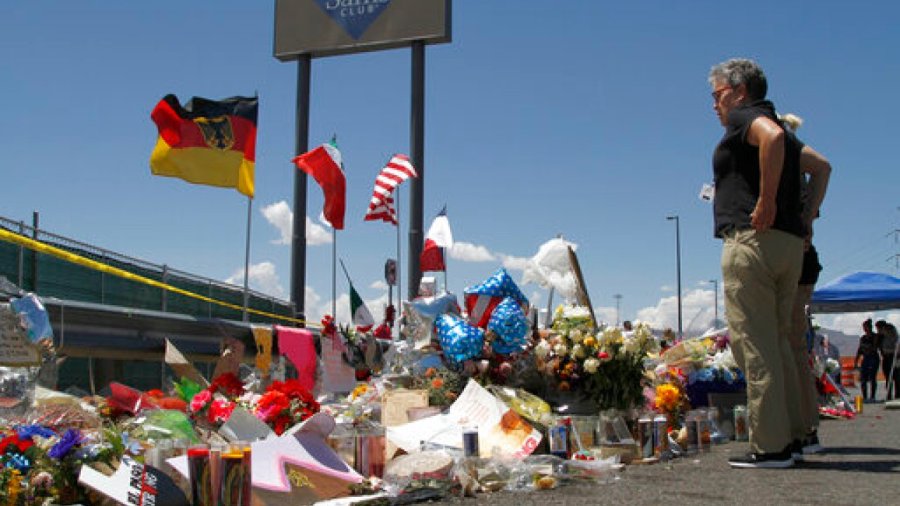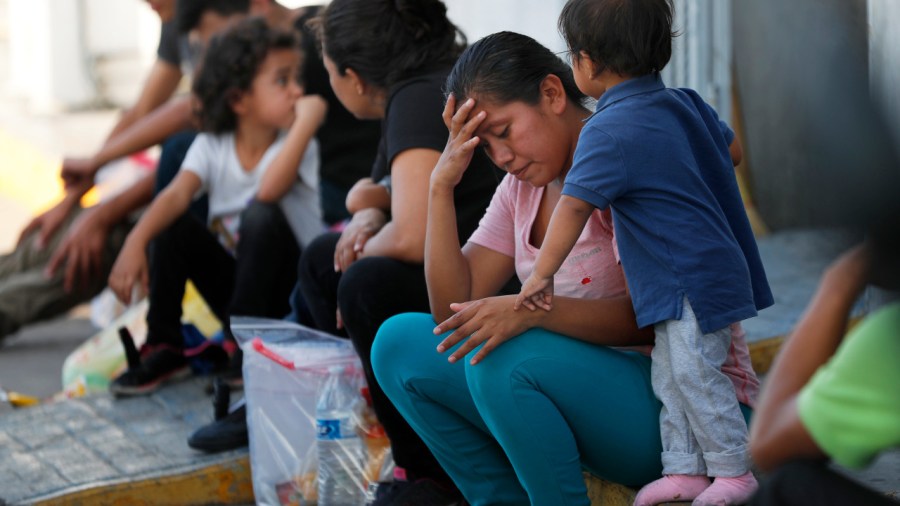EL PASO, Texas (Border Report) — Wearing a yellow-and-black “El Paso Strong” button on his coat, Mayor Dee Margo this week gave Border Report his take on the recent U.S. Conference of Mayors meeting in Washington, D.C.
The button was fitting, for Margo was asked at the conference to share El Paso’s experience after the Aug. 3 mass shooting that left 22 people dead and 24 injured at a Walmart on the city’s East Side.
“I said two things. One, that what happened to El Paso was an evil, white supremacist racist that came from 700 miles away. We were attacked because of who we are,” he said. His city, according to the Census Office, is more than 80% Hispanic.
Margo shared the stage with mayors from Chicago, Orlando, Dayton and other communities that have experienced mass shootings in the past few years. The debate hovered around gun control, but that’s something that hasn’t been an issue in this normally peaceful, family-oriented border community. In 2018, the year before the mass shooting, El Paso only recorded 18 murders all year, the Mayor said.

“My focus was on the mental aspect, the healing that we are going to continue to need to go through, which I think will take some years, and the fact that our tragedy is still pretty raw. It’s been less than six months,” Margo said.
He added that support is still ongoing for El Pasoans traumatized by the shooting and others who need information on where to get help on their own.
The shooting claimed the lives of parents who fell while covering their baby, grandparents out shopping on a warm Saturday morning and visitors from Mexico who stopped at the Walmart before or after going into Cielo Vista Mall next door. Eight of the dead were Mexican residents, including a former radio executive and a middle-aged elementary school teacher who had just been promoted to principal.
“I was asked if I was surprised if eight of our victims were Mexican nationals. My answer was, ‘absolutely not!’ That’s who we are. We’re families on both sides (of the border). That’s hard for people who don’t know the border to understand,” Margo said. “So I did the best I could to articulate who were are and what drives us.”
He emphasized the tranquility enjoyed by El Pasoans and its low crime rate. “El Paso is one of the safest cities in America, if not the safest, and it’s been like that for many years and will continue to be,” he said. The Walmart massacre “was an anomaly. It was atypical. It’s not who we are. That is not our community.”
Immigration reform is a must
The Conference of Mayors also asked Margo to share his experience with the migrant surge and humanitarian crisis that overwhelmed border cities and shocked the nation.
“I talked about our situation on the border and where we were. … We had 29,000-plus immigrants from Cuba, Guatemala, Honduras — you name it — in Juarez. Many of them were on the bridges and were limited to NGO support. That was a concern,” he said.

Tens of thousands of migrants, many of them families seeking asylum due to violence or poverty in their home countries, were suddenly turned back to wait in Mexico under the Trump administration’s Migrant Protection Protocols (MPP) program. The migrants initially overwhelmed unprepared and underfunded Juarez shelters, and many reported being preyed upon by street criminals.
The long waits — and a crackdown by the Mexican government beginning in June of last year — stemmed the flow of migrants from Central America and discouraged those already in line in places like nearby Juarez, Mexico.
“I’ve learned, since coming home (from the conference) that a vast majority of those have been dispersed or gone home. They’re not even sensing a real concern (on the Mexican side) at this moment,” he said.
But if Americans at large think the issue of unauthorized migration has been resolved, they’re wrong. “The immigration challenges will not go away until Congress builds some fortitude on both sides of the aisle to deal with rational immigration reform at all levels,” Margo said.
That will happen when lawmakers assume the pragmatism that permeates the Conference of Mayors meetings.
“The U.S. Conference of Mayors is designed to be a bipartisan get-together to develop best practices and communication for mayors for cities of all sizes on what works best and what doesn’t. One of the comments is that a pothole is neither Republican or Democrat. It’s just something we have to fix,” Margo said.
Visit the BorderReport.com homepage for the latest exclusive stories and breaking news about issues along the United States-Mexico border.
















